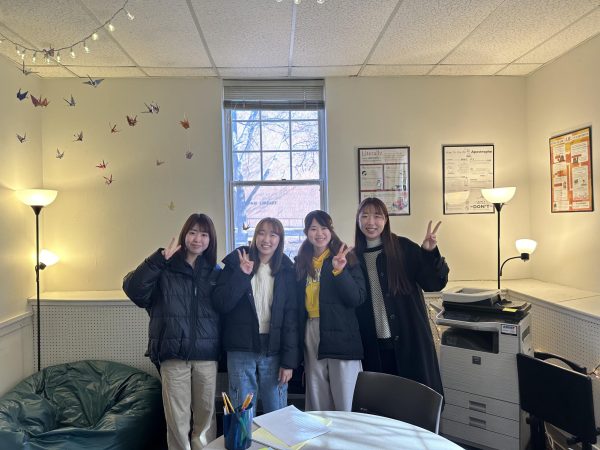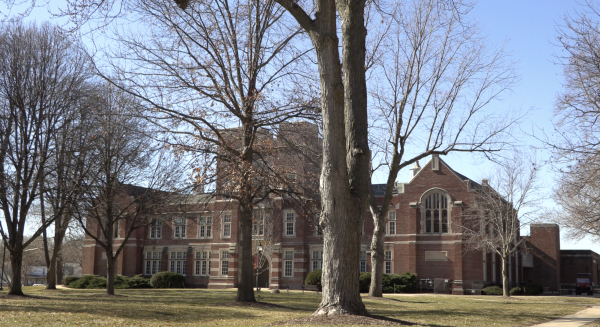‘Intellectual Theft’: Plagiarism plagues professors
October 18, 2011
Academic dishonesty does not have a positive outcome for any party involved.
The handbook defines academic dishonesty as “any form of cheating, plagiarism, unauthorized collaboration, fraud (falsifying documents, forging signatures, altering records, etc.), misreporting any absence as college-sponsored or college-sanctioned, submitting a paper written in whole or in part by someone else, or submitting a paper that was previously submitted in whole or in substantial part for another class without prior permission.”
“It’s intellectual theft,” said Tracy Lucht, assistant professor of communication and media studies.
In order to ensure that students are aware of what qualifies as being academically dishonest; freshmen are now taking an online course as part of their Simpson Colloquium. This course is in the form of an online tutorial complete with examples and a quiz.
“The purpose of it is to make sure that you, the student, understands plagiarism and its forms,” said Steve Griffith, senior vice president and academic dean. “There’s three different types of plagiarism, so it takes you through that by asking you different questions and has you look at ‘is this material plagiarized from this?'”
The most common act of plagiarism committed is not using the proper citation process. Others include the stealing of ideas and even overall structure of an already published document.
“The most obvious form is just copying something and putting it in your paper without quotation marks and without attribution,” Griffith said. “The most sophisticated type is when you take somebody else’s ideas; you sort of read something and then paraphrase, in your own words, what they said and put that in your paper as your own work. Even just taking the structure of somebody’s work, that’s also considered plagiarism.”
This course is designed to inform and hopefully lessen the number of students who choose to be academically dishonest in the future.
“It helps you learn about plagiarism so then you won’t do it in the future,” Griffith said.
Today, plagiarizing material is easier than ever, but so is getting caught. Professors are able to search the Internet just as freely and effortlessly as students do, thus making it virtually impossible not to get caught.
If a student is caught, the punishment varies based on the professor. Each member of the faculty decides what course of action he or she takes when a student is found to be committing an act of academic dishonesty. They may get a zero on the assignment or even fail the course.
“Sometimes it’s just carelessness,” said Judy Walden, assistant professor of history. “Someone has left out a quotation mark, but cited properly. Sometimes it’s very clearly, ‘here’s half of a Wikipedia article that I’m saying is my own.’ I deal with those differently.”
All forms of academic dishonesty must be turned into Griffith, who then schedules a meeting with the individual and creates a file for them in case of any future incidents.
If a student is caught for a second time, the punishment may become more severe.
“If the student does it again, the student can be dismissed for the plagiarism or suspended,” Griffith said. “The student typically has to sit out for at least a semester, and then apply to come back.”
These types of incidents can also put a student’s future plans at risk.
“I have also had situations when majors or advisees need to come looking for recommendations later for graduate school or jobs,” Associate Professor of Religion Mark Gammon said. “If you’ve been caught cheating, how can a professor not mention that?”
Plagiarism may have a negative effect on the student, but it also has the possibility to harm the reputation of the original author.
“People have plagiarized my writing in the past, and what frustrates me is not just that they took my hard work, my original work, and claimed it as their own, but by doing that, by duplicating my writing, they raised the possibility that someone might not think that my writing is original,” Lucht said. “That’s really disturbing for me because as an academic, as a scholar, my writing, my ideas and my research form my reputation, so that’s really damaging to me on multiple levels.”
A third party is greatly affected by the act of plagiarism as well, the professor.
“Contrary to what some seem to think, no professor finds joy in catching a plagiarist – it is all disappointment, frustration, and sometimes anger,” Gammon said. “Very few students admit to it, even when the evidence is incontrovertible, which leads to taxing, emotional conversations, and often excuses that are insulting to our intelligence.”
The act of plagiarism has a negative effect on every party involved. If nobody wins in the end, why do individuals still feel the need to try to cheat the system?
“If you’re taking shortcuts, you’re not going to learn and grow,” Griffith said. “What’s the point of being here if you’re taking these kinds of shortcuts? It’s just wrong and it’s a shortcut and violates the basic premise of the academic community.”
If a due date is fast approaching and the assignment is not completed, students can ask the professor for an extension instead of looking up an essay on the Internet to turn in.
“I would much rather get writing from a student that is lacking in some way but intellectually honest than get a copy of what somebody else has thought or written,” Lucht said. “I value intellectual honesty and intellectual authenticity.”
Overall, the decision to turn in material that is not in the student’s words says a great deal about their character and values.
“It’s a fundamental question of honesty and ethics,” Walden said. “I think in the long run, it doesn’t speak well about someone’s character if they are taking that shortcut.”














